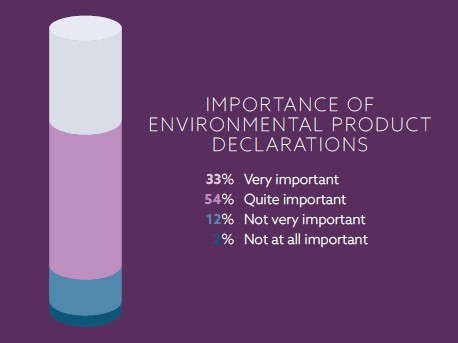
NBS and Quiet Mark announce strategic partnership to prioritise wellbeing in buildings through noise reduction
06 December 2021
NBS has announced a new partnership with Quiet Mark to empower architects to specify ‘acoustics f...
24 May 2023 | By NBS
NBS study finds that manufacturers are not offering enough third-party verification on sustainability credentials (EPDs).

A study by leading specification and construction product information platform, NBS, has discovered that just under half (43%) of construction professionals say it isn’t easy to find comprehensive detail about the safety performance and sustainability of building products.
This, despite the fact that nine in ten architects said they considered third-party credentials to be ‘essential’ for safety-critical products, highlighting a need for manufacturers to verify technical information supplied for their products.
The findings are part of a series of revelations from NBS’ recently published ‘What Specifiers Want Report’ – a study focusing on how building product manufacturers can make the most of their product data.
Notably, NBS’ research team also found that 86% of specifiers consider Environmental Product Declarations (EPDs) to be an important aspect of their decision-making process.
The research shows there is still some way to go towards industry-wide adoption of carbon reduction measures. Just one in seven (14%) specifiers said they choose the most sustainable product on every specification. Similarly, nearly half (45%) said while they try to choose the greenest option, they can be swayed by cheaper alternatives.
Somewhat encouraging is the revelation that fewer than one in ten (7%) of specifiers fail to consider sustainability at all.
These findings imply that a lack of readily available carbon information is hindering sustainable specification. To enable specifiers to identify the most sustainable building products, manufacturers need to supply comprehensive detail about their ranges. While some manufacturers are not doing this, anecdotally, those who do are reporting an increase in demand for both data requests and resulting specifications.
Ben Hancock, Managing Director of Oscar Acoustics, an architectural acoustics specialist said: “Over the past year, more architects have asked us about our environmental credentials, they’ve told us that their clients want sustainable builds and so are looking to make greener choices at every step. We’re getting direct approaches from specifiers, as well as seeing a significant increase in digital downloads from NBS Source for our sustainable and product performance certifications. Also, once architects know we have sustainable certifications, we see repeat business which I’m confident is partially due to the environmental benefits of our products.”
Harpreti Dhaliwal, Technical Advisor, EPR Architects said: “Increasingly projects require us to meet sustainable standards such as WELL or BREAM, and thus we need to be able to find and compare EPDS. While an EPD isn’t itself a marker of meeting an environmental standard, it does allows us to directly compare data about construction products.”
She added; “Those manufacturers who provide structured data in a standardised format are making it easier for specifiers and thus increasing likelihood of specification.”
With external factors continuing to constrain construction sector activity, particularly supply chain issues and materials shortages, product substitution is commonplace so that projects can be completed on-time. According to the research, eight in ten (81%) specifiers see products substituted, resulting in plans deviating from the original specification.
Certification allows specifiers and broader project teams to quickly compare the credentials of building products, even if they are impacted by ‘specification breaking’, helping them to make informed sustainable decisions throughout the project lifecycle.
With increased scrutiny of architects’ design decisions on structural and fire safety, third-party credentials also have a role to play in ensuring the built environment improves its track record on safety.
Commenting on the research findings, Russell Haworth, CEO of NBS, said: “Architects and other specifiers have made it clear; they need to see verifiable, third-party credentials on technical information for building products. The manufacturers able to provide this data are leading the way from a safety and environmental perspective, and are more likely to get specified. I expect these findings will lead to further manufacturers investing in certification and this will help to ensure compliance across the construction industry, maintaining a ‘golden thread’ of data on design decisions for structural and fire safety.
“Architects recognise the importance of verifying safety-critical and carbon information for projects, this is a significant step in the right direction for accountability across the building supply chain.”
For more information, please contact:
The Think Tank (NBS)
Jo Wilmot or Niamh Meyer at The Think Tank 020 7831 2225, joannaw@thinktank.org, niamhm@thinktank.org.uk